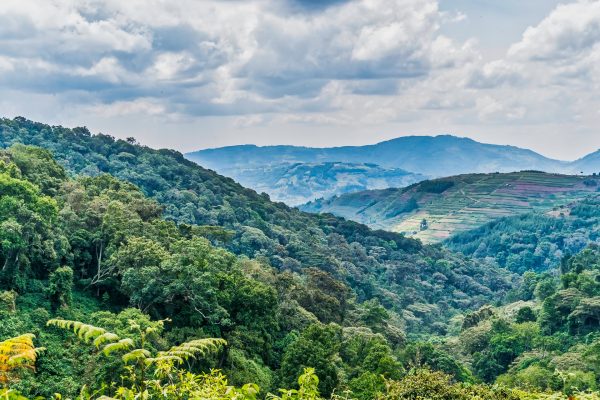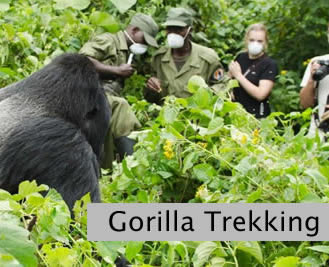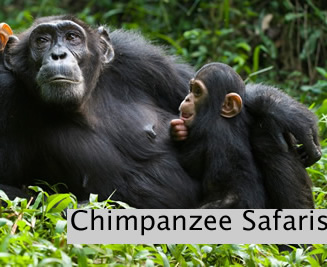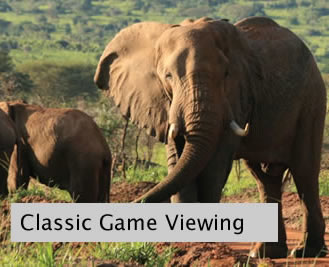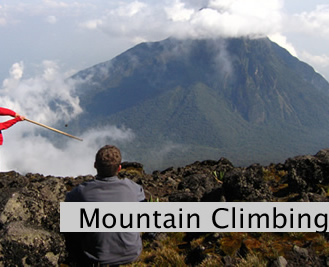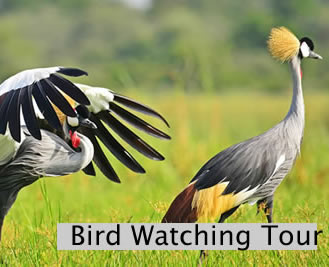As a new strategy the prevent the further spread of the deadly Virus, Rwanda has deployed 5 humanoid robots to help in the fight. Rwanda ministry of health received the 5 robots from the United Nations Development Program (UNDP) in mid May 2020. The new robots will help to ease service delivery systems in Kanyinya health Centre were Covid19 patients are treated. Rwanda was the first African country to introduce robots to assist medical workers in the fight against the deadly corona virus. Upon arrival, the five robots where given Kirwanda names which are Akazuba, Urumuri, Mwiza, Ngabo and Ikizere. Other countries that have used robots to help in fighting against deadly corona virus include China, Switzerland, South Korea and Belgium These were the first countries to register corona virus which has claimed thousands of l people and infecting millions. Rwanda registered her first covid19 positive case in March 2020 and was the first East African country. The government immediately put the whole country under lock down for close to 2 months with minimal business in operations. The major aim for the introduction of the anti tech robots in Rwanda is to limit the chances of health workers from catching the deadly Corona Virus. Health workers are at the frontline and susceptible to catch the Virus
How do Zoro robots operate?
 Like all other robots, the Rwanda copvid19 robots will be computerized. YES, everything will be under the control of the computer. One robot has a capacity to screen between 50 to 150 people per minute, which will ease the work of screening for the new patients. While addressing some Rwanda officials, one robot assured them of the positive results. In its computerized address, one robot said” I have been so resourceful in China, South Korea, Switzerland, Belgium and Netherlands”. This gave confidence to medical workers at Kanyinya facility that indeed; the country will fight Corona Virus with the help of the robots. The things that will be done by the robots in fighting Corona Virus in Rwanda include:
Like all other robots, the Rwanda copvid19 robots will be computerized. YES, everything will be under the control of the computer. One robot has a capacity to screen between 50 to 150 people per minute, which will ease the work of screening for the new patients. While addressing some Rwanda officials, one robot assured them of the positive results. In its computerized address, one robot said” I have been so resourceful in China, South Korea, Switzerland, Belgium and Netherlands”. This gave confidence to medical workers at Kanyinya facility that indeed; the country will fight Corona Virus with the help of the robots. The things that will be done by the robots in fighting Corona Virus in Rwanda include:
1. Screening the new suspects
2. Measuring temperatures for the suspects and patients
3. Delivering food to Covd19 patients
4. Delivering medication to the Covid29patients in their wards
5. Check people not wearing masks and alert them to wear masks
6. Monitoring corona Virus patients
7. Notify health workers about new detectives
8. Keep records of all Covid19 patients in the hospital
9. Address and give guidelines to the patients
Cost of Anti Tech Robots
Each robot is estimated to cost roughly £2,700. However, the services of these robots is worth the penny. The anti tech robots are manufactured by a Belgium company. All countries are advised to purchase the robots to ease the fight against the deadly Corona Virus.
Corona Virus Cases in Rwanda
Since March when Rwanda registered her first Corona Virus positive case, the number has raised to 369 positive cases, 244 recoveries and no death as of 27th May 2020. The country was locked down for 2 months to curb the spread of the virus. On 4th May 2020, the government eased the lockdown by allowing essential workers to go back for work, private cars and public cars to operate but carrying a minimum number of passengers as specified by the government. Markets were also allowed to operate but with a high observation of social distance.
REMINDER: WEARING A FASLK MASK IN PUBLIC IS A MUST FOR EVERY BODY.
Tourism in Rwanda Amidst corona Virus
 Apparently, all Rwanda safaris to Volcanoes National Park, Nyungwe Forest National Park, Akagera National Park, Gishwati Mukura National Park and all other tourism destinations in Rwanda are on a temporarily suspension till further notice. Gorilla Trekking and chimpanzee tours were the first activities to suspend fearing the spread of the deadly virus to the endangered mountain gorillas and chimpanzees. Fortunately, Rwanda Development Board relaxed on its gorilla permit and chimpanzee permit cancellation policy to allow travel operators reschedules the already booked permits to a future date. Travel operators can now reschedule and book Rwanda gorilla permits and chimpanzee safaris to any date till 2022 without any penalty. Shortly after the total defeat of Corona Virus, Rwanda will reopen for tourism to reward travelers with amazing wildlife experiences. For the meantime, embrace Rwanda’s virtual gorilla tours and experience gorilla trekking from your sitting room.
Apparently, all Rwanda safaris to Volcanoes National Park, Nyungwe Forest National Park, Akagera National Park, Gishwati Mukura National Park and all other tourism destinations in Rwanda are on a temporarily suspension till further notice. Gorilla Trekking and chimpanzee tours were the first activities to suspend fearing the spread of the deadly virus to the endangered mountain gorillas and chimpanzees. Fortunately, Rwanda Development Board relaxed on its gorilla permit and chimpanzee permit cancellation policy to allow travel operators reschedules the already booked permits to a future date. Travel operators can now reschedule and book Rwanda gorilla permits and chimpanzee safaris to any date till 2022 without any penalty. Shortly after the total defeat of Corona Virus, Rwanda will reopen for tourism to reward travelers with amazing wildlife experiences. For the meantime, embrace Rwanda’s virtual gorilla tours and experience gorilla trekking from your sitting room.
Cost of Post covid19 Rwanda Safaris
Are you planning to visit Rwanda post covid19? Wondering on the cost of Rwanda safaris? No worries, African Apes Tours gives you the details. The cost of Rwanda safaris varies depending on which tourist activity you intend to do, the number of days for a trip, number of people on a trip and the choice of accommodation. For those visiting to trek mountain gorillas, a single Rwanda gorilla permit costs $1500 inclusive of the park entrance fee and conservation fee. Chimpanzee safaris in Rwanda costs $100 and golden monkeys cost $100. However, travelers receive a higher quote depending on which safari activities you choose to do. Contact us today, specify which trip you intend to do and we shall give you a safari quotation to suit your budget.
Conclusively therefore, the use of anti tech robots to fight corona Virus in Rwanda is a great achievement for the government of Rwanda. We congratulate the ministry of health in Rwanda and hope for the best.


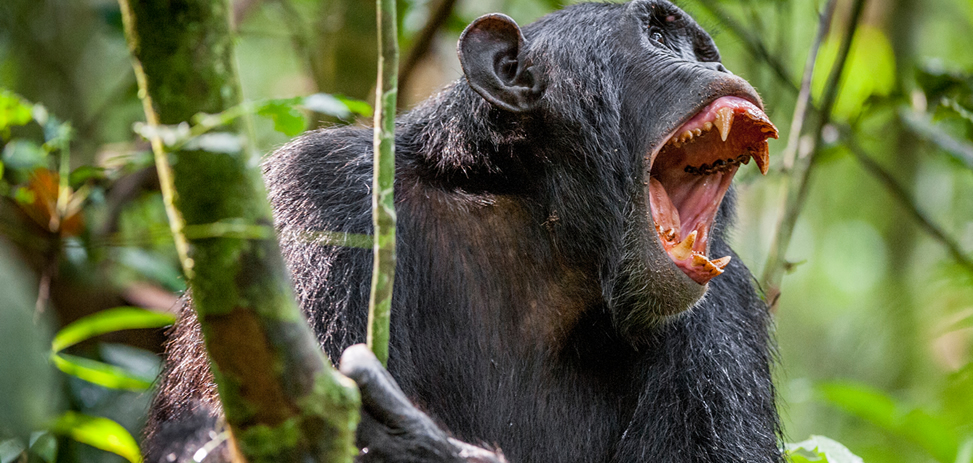
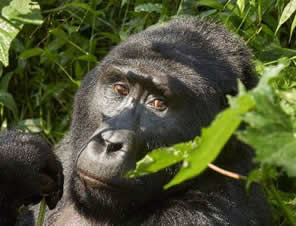 Done in the bamboo forests of Volcanoes National Park,
Done in the bamboo forests of Volcanoes National Park, 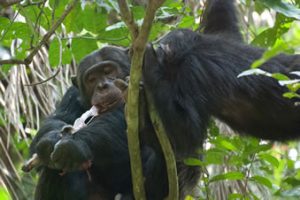 Enjoy guided chimpanzee trekking in Nyungwe Forest National Park with African Apes Holidays. Rwanda safaris to trek chimpanzees in
Enjoy guided chimpanzee trekking in Nyungwe Forest National Park with African Apes Holidays. Rwanda safaris to trek chimpanzees in 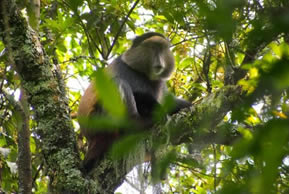 Do not miss golden monkey trekking in Volcanoes National Park. a permit to trek golden monkeys cost $100 which is relatively cheap compared to the gorillas in the same forest. Enjoy a magical encounter with the playful, lively and beautiful golden monkeys in their natural habitats. Volcanoes National Park is home o over 500 golden monkeys while the other population lives in Mgahinga Gorilla National Park. Fortunately, treks to see golden monkeys costs $100, which is quite cheap, compared to mountain gorillas in the same forest
Do not miss golden monkey trekking in Volcanoes National Park. a permit to trek golden monkeys cost $100 which is relatively cheap compared to the gorillas in the same forest. Enjoy a magical encounter with the playful, lively and beautiful golden monkeys in their natural habitats. Volcanoes National Park is home o over 500 golden monkeys while the other population lives in Mgahinga Gorilla National Park. Fortunately, treks to see golden monkeys costs $100, which is quite cheap, compared to mountain gorillas in the same forest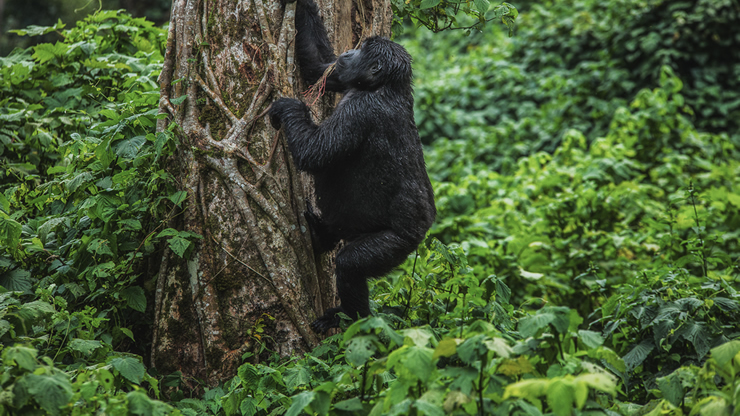
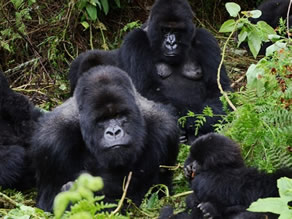

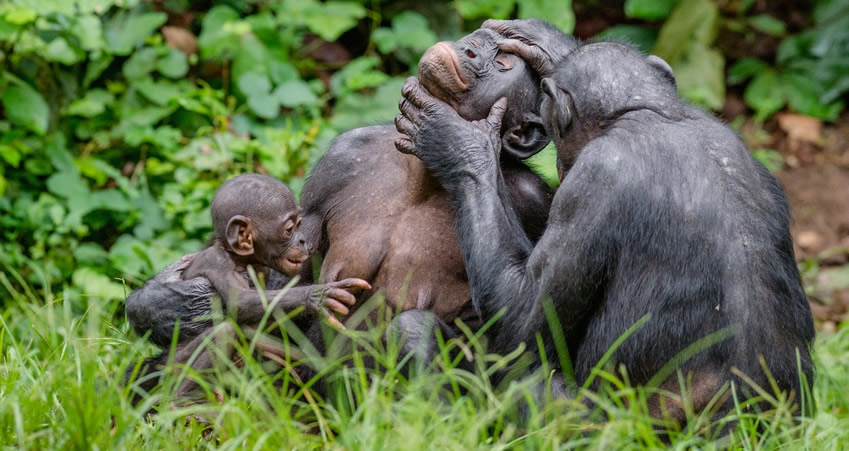
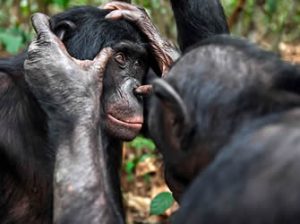 Wondering the examples of the apes?, Well, Apes in Africa include mountain gorillas, chimpanzees, bonobos, orangutans, humans and Gibbon. Mountain gorillas and chimpanzees are the most visited apes in Africa. Check the best places to see apes with African Apes Holidays:
Wondering the examples of the apes?, Well, Apes in Africa include mountain gorillas, chimpanzees, bonobos, orangutans, humans and Gibbon. Mountain gorillas and chimpanzees are the most visited apes in Africa. Check the best places to see apes with African Apes Holidays: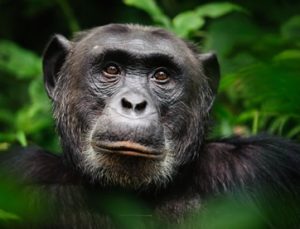 More so, Uganda is home to the highest population of chimpanzees in East Africa. Chimpanzee trekking in Uganda takes place in
More so, Uganda is home to the highest population of chimpanzees in East Africa. Chimpanzee trekking in Uganda takes place in 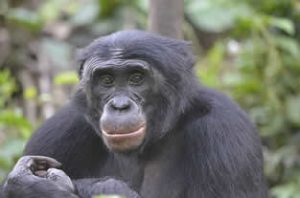 If you want to have the off beaten Apes safari experience, then Congo is your ultimate apes destination. The Democratic Republic of Congo is home to the endangered mountain gorillas sheltered in Virunga National Park. A
If you want to have the off beaten Apes safari experience, then Congo is your ultimate apes destination. The Democratic Republic of Congo is home to the endangered mountain gorillas sheltered in Virunga National Park. A 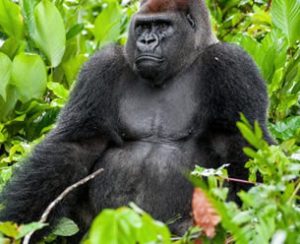 Visit the Montane forests of Cameroon and Nigeria to trek the endangered Cross-river gorillas. Scientifically called Gorilla gorilla diehli, Cross River gorillas are a subspecies of the western gorillas. The gorilla specie is critically endangered with between 200 to 300 individuals left in the whole world. The major threats to the survival of cross-river gorillas are habitat loss, civil conflicts and poaching.
Visit the Montane forests of Cameroon and Nigeria to trek the endangered Cross-river gorillas. Scientifically called Gorilla gorilla diehli, Cross River gorillas are a subspecies of the western gorillas. The gorilla specie is critically endangered with between 200 to 300 individuals left in the whole world. The major threats to the survival of cross-river gorillas are habitat loss, civil conflicts and poaching.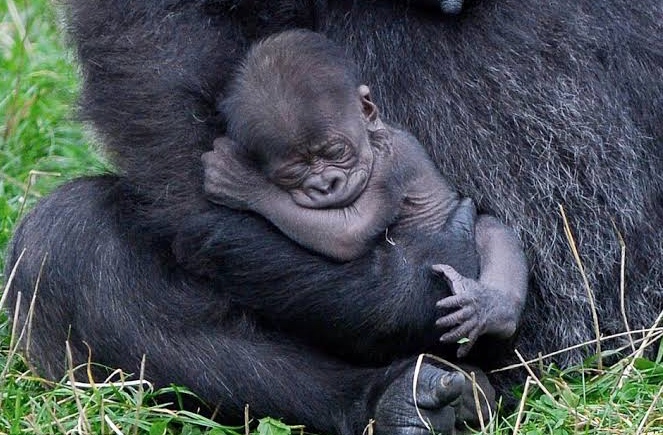

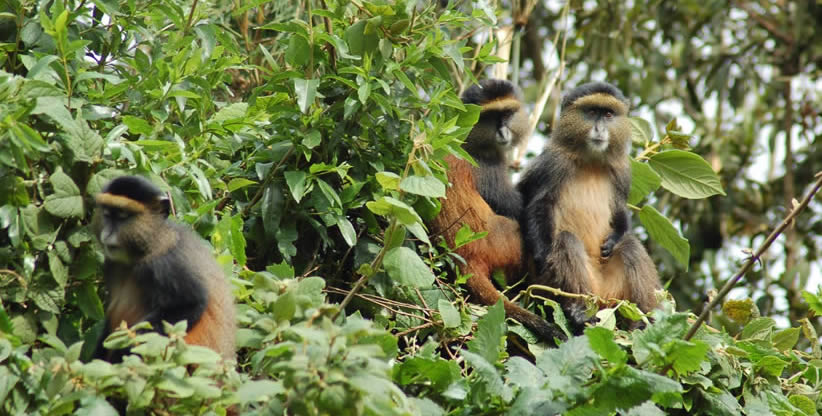
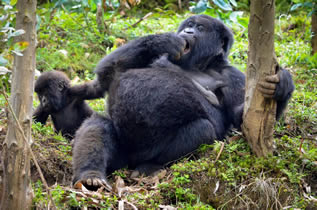 Inhabited in the jungles of Bwindi Impenetrable Forest and Mgahinga Gorilla National Park, Mountain gorillas are the iconic attractions in Uganda. Over 60% of travelers to Uganda visit to trek gorillas rewarding them with a lifetime experience. Mountain
Inhabited in the jungles of Bwindi Impenetrable Forest and Mgahinga Gorilla National Park, Mountain gorillas are the iconic attractions in Uganda. Over 60% of travelers to Uganda visit to trek gorillas rewarding them with a lifetime experience. Mountain 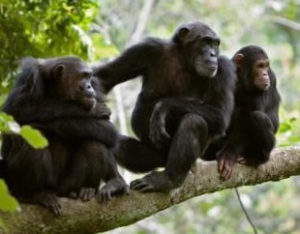 Chimpanzee safaris are among top safari experiences in Uganda. YES, a chimpanzee trekking safari to
Chimpanzee safaris are among top safari experiences in Uganda. YES, a chimpanzee trekking safari to 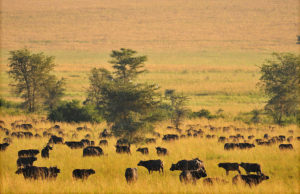 Go game viewing in the open savannah parks of Uganda.
Go game viewing in the open savannah parks of Uganda.  Visit to see the endangered golden monkeys in Mgahinga Gorilla National Park southwestern Uganda. It’s only in Mgahinga that travelers get a close encounter with the playful and lively golden monkeys. A permit to trek golden monkeys in Uganda costs $100 inclusive of par entrance fees, conservation, and rangers fee. Golden monkey trekking starts at the Ntebeko information center preceded by a simple briefing. African Apes Tours & Travel helps you book a golden money trekking tour at affordable rates. If you have limited time, you can fly into Kigali Rwanda and cross to Mgahinga via Cyanika border in Kisoro district.
Visit to see the endangered golden monkeys in Mgahinga Gorilla National Park southwestern Uganda. It’s only in Mgahinga that travelers get a close encounter with the playful and lively golden monkeys. A permit to trek golden monkeys in Uganda costs $100 inclusive of par entrance fees, conservation, and rangers fee. Golden monkey trekking starts at the Ntebeko information center preceded by a simple briefing. African Apes Tours & Travel helps you book a golden money trekking tour at affordable rates. If you have limited time, you can fly into Kigali Rwanda and cross to Mgahinga via Cyanika border in Kisoro district.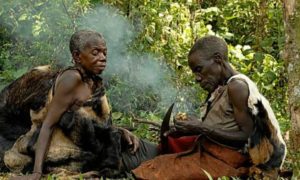 Uganda’s diverse cuture is an exceptional safari package worth exploring on your Uganda safari. Uganda is comprised of over 50 tribes each of which is different in terms of culture, norms and traditions. The most visited cultural communities in Uganda are the Batwa pygmies who are the former dwellers of Bwindi Forest and Mgahinga Gorilla National Park. These very short people lived for 1000s of years with wild animals especially the mountain gorillas in harmony. Batwa depended fully on the forests for hunting, fruit gathering and the honey collection as their source of food and livelihood. However, after the introduction of gorilla trekking in Uganda, Batwa pygmies were relocated to the forest borders where they currently. The
Uganda’s diverse cuture is an exceptional safari package worth exploring on your Uganda safari. Uganda is comprised of over 50 tribes each of which is different in terms of culture, norms and traditions. The most visited cultural communities in Uganda are the Batwa pygmies who are the former dwellers of Bwindi Forest and Mgahinga Gorilla National Park. These very short people lived for 1000s of years with wild animals especially the mountain gorillas in harmony. Batwa depended fully on the forests for hunting, fruit gathering and the honey collection as their source of food and livelihood. However, after the introduction of gorilla trekking in Uganda, Batwa pygmies were relocated to the forest borders where they currently. The 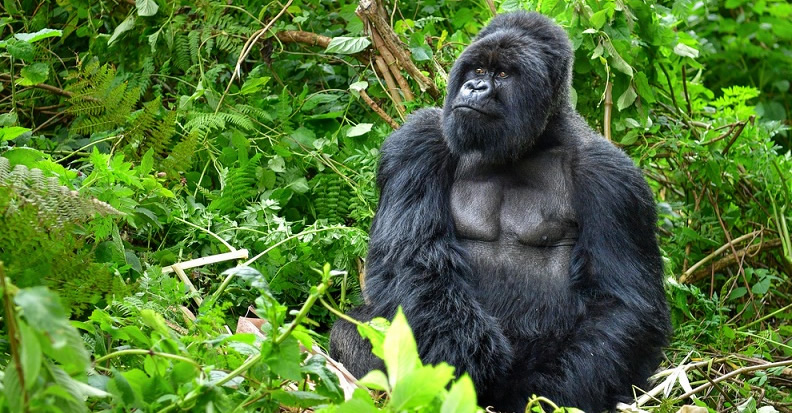
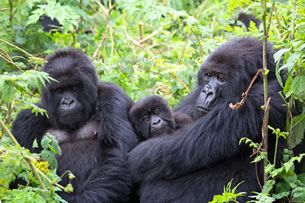 Gorillas begin their day in the early morning hours at around 6:30 when they can see and start their feeding in this time till they around the mid-morning hours and take some rest to digest their full bellies in the afternoon. The mature gorillas lie as they rest as the juveniles continue to play running around in the watch of the silverback. They sleep in nests constructed in the evening hours by each of them. The babies stay with their mums in their nests until around age three when they become a little independent from their mothers.
Gorillas begin their day in the early morning hours at around 6:30 when they can see and start their feeding in this time till they around the mid-morning hours and take some rest to digest their full bellies in the afternoon. The mature gorillas lie as they rest as the juveniles continue to play running around in the watch of the silverback. They sleep in nests constructed in the evening hours by each of them. The babies stay with their mums in their nests until around age three when they become a little independent from their mothers.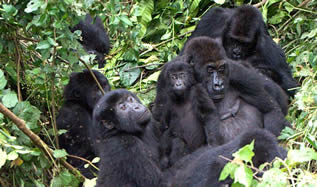 Best Time to Visit gorillas
Best Time to Visit gorillas